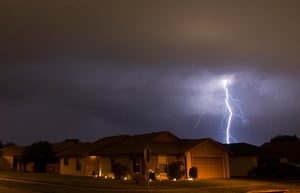
Spring is here; summer is right around the corner – and in the Midwest, that means these seasons can bring with it thunderstorms, hail and even tornadoes.
These powerful weather events can wreak havoc on homes and communities, and they also come with unique fire risks to stay aware of. In this blog, we’ll take you through everything you need to know about fire safety and storms, so that you’re prepared when severe weather strikes.
Fire Hazards
If a strong storm or tornado hits your neighborhood, powerful winds can cause all sorts of damage, including:
-
Leaking gas lines
-
Damaged vehicles
-
Appliances/vehicles exposed to water
-
Downed utility or electrical lines
-
Exposed electrical wiring
-
Debris near cut electrical wires or transformers
All of these things can pose huge fire risks, and you should avoid going near any of the above until professionals are able to come ensure they’re not a risk. Also avoid touching or going into any sort of water, in case there is electricity present.
Additionally, be aware of the risk posed by lightning in and of itself. If lightning strikes your home, there’s a very good chance it will start a fire – along with frying all of your appliances and outlets. To learn more about the risks of lightning specifically, check out this blog on the topic.
Fire Safety Measure to Take
Fortunately, there are some things you can do to prepare for severe weather before it happens.
With charcoal grills, keep in mind the following tips:
-
Make sure all of your smoke detectors work and have backup batteries in them
-
Test your smoke alarms and carbon monoxide detectors at least once a month
-
Use surge protectors to protect your appliances
-
Unplug appliances when you know a storm is coming
-
Report any downed power lines immediately to the authorities
-
Talk to your family about the severe weather plan, including where to meet up if the home must be evacuated
-
If your home is struck by lightning, immediately evacuate and call the authorities to check for a fire, even if you cannot see or smell one
Along with the general above steps, know what to do in the case of a tornado watch or warning. If you have a basement, go down into it as soon as the warning is issued or the sirens go off. If you don’t have a basement, talk to your family about where to go – ideally an interior room with no windows, like a bathroom.
And, don’t shower or wash dishes during a thunderstorm, because if your house is struck by lightning, the electricity can travel through the pipes and water to shock you.
Other Need-to-Knows
Even if your home escapes damage, it’s important to be prepared for things like power outages, which are likely to occur. Make sure you have plenty of flashlights with backup batteries on hand. Never use candles for emergency lighting – they can be a huge fire hazard, especially if left in unattended rooms.
You should also try to keep plenty of nonperishable food and bottled water in a safe place, like the basement where you would be sheltering in a storm.
If you have a generator, make sure it’s always used outdoors, at least 20 feet away from the home or garage. Keep it dry and never touch it when its wet, as this can electrocute you. Always use the correct, heavy-duty extension cord when connecting the generator.
You’ll also want carbon monoxide detectors – with backup batteries in case of a power outage – on every level of your home.
When it comes to severe weather, there’s a lot to consider and prepare for. At CertaSite, we’re here to help. Let us protect your home or business from fire and life safety threats so that you know your people and property are always protected. Get started today at CertaSitePro.com.
